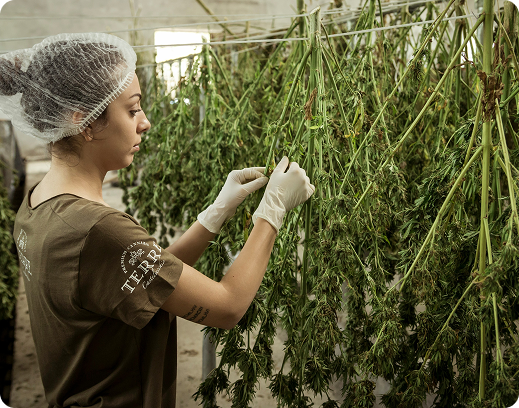How to Open a Dispensary in Vermont
Are you interested in entering the thriving cannabis industry? With the legalization of recreational cannabis in Vermont in 2022, there has never been a better time to consider opening a dispensary in Green Mountain State.
According to a recent report, Vermont’s cannabis market is projected to reach $225 million by 2025, creating a lucrative opportunity for entrepreneurs and enthusiasts alike.
This article will guide you on how to open a dispensary in Vermont. Read on to discover the key steps and essential information you need to venture into this exciting journey.

Overview of Cannabis in Vermont
Are you interested in entering the thriving cannabis industry? With the legalization of recreational cannabis in Vermont in 2022, there has never been a better time to consider opening a dispensary in Green Mountain State.
According to a recent report, Vermont’s cannabis market is projected to reach $225 million by 2025, creating a lucrative opportunity for entrepreneurs and enthusiasts alike.
This article will guide you on how to open a dispensary in Vermont. Read on to discover the key steps and essential information you need to venture into this exciting journey.
Vermont has experienced significant developments in its cannabis legislation, with the legalization of both medical and recreational cannabis making it an ideal state for aspiring dispensary owners.
Why Start a Cannabis Business?
Opening a dispensary offers immense opportunities:
-
High Demand
With the growing acceptance of medical and recreational cannabis across multiple states and countries, dispensaries are seeing a surge in demand. Consumers are increasingly looking for high-quality products for health, wellness, and leisure, creating a constant need for reliable, accessible dispensaries.
-
Job Creation
The cannabis industry is projected to create thousands of jobs across various sectors, including cultivation, retail, logistics, and marketing. This growth not only provides employment opportunities but also contributes to local and national economies.
-
Strong ROI Potential
Entrepreneurs who navigate the complex regulatory landscape can make big returns on their investments. With proper business planning, branding, and compliance, dispensaries can tap into a rapidly growing market with high-profit margins.
Types of Dispensary Licenses in Vermont
Vermont offers various types of dispensary licenses, each catering to different aspects of the cannabis market and providing distinct opportunities for entrepreneurs to establish their businesses.
Conditional Adult-Use Retail Dispensary License (CAURD) in Vermont
The Conditional Adult-Use Retail Dispensary License (CAURD) is a specific license in Vermont’s cannabis industry. It allows for the sale of adult-use cannabis products to consumers.
To obtain a CAURD, applicants must meet specific criteria, such as demonstrating financial stability, passing background checks, and having a suitable location for the dispensary. Successful applicants will be granted the opportunity to operate a retail dispensary in compliance with state regulations.
Other License Types for Cannabis in Vermont
In addition to the CAURD, Vermont offers various license types to accommodate different aspects of the cannabis industry. These include the Cultivation License, which permits the cultivation of cannabis plants for both medical and adult-use purposes.
There is also the Product Manufacturer License, which allows for the production and manufacturing of cannabis-infused products.
Furthermore, there are licenses for Testing Laboratories, Wholesalers, and Integrated Licenses, offering diverse opportunities for entrepreneurs to participate in the cannabis market.

Understanding the Cannabis Market in Vermont
The cannabis market in Vermont is characterized by a combination of medical and recreational use, creating a diverse consumer base. With an emphasis on local and artisanal products, consumers in Vermont appreciate high-quality cannabis offerings.
The regulatory framework promotes a competitive yet controlled market, ensuring compliance with stringent standards. Understanding consumer preferences, market trends, and regulatory requirements is key to thriving in Vermont’s evolving cannabis industry.
Application Process for a Dispensary License
Steps Involved in Obtaining a License
- Complete the application form: Fill out the required application form provided by the cannabis regulatory authorities in Vermont.
- Provide detailed business plans: Develop comprehensive business plans that outline the proposed operations, marketing strategies, financial projections, and compliance measures.
- Undergo background checks: Applicants and key stakeholders are subjected to thorough background checks to assess their suitability for operating a dispensary.
- Secure a suitable location: Find a location that meets the zoning requirements, distance restrictions, and other criteria set by the state and local regulations.
- Demonstrate compliance with security and operational requirements: Showcase robust security protocols, inventory management systems, quality control measures, and adherence to health and safety regulations.
- Engage with local authorities: Communicate and collaborate with local government officials, planning boards, and community stakeholders to address concerns and ensure compliance.
- Attend hearings and public meetings: Participate in public hearings and meetings to present the dispensary plans, address any inquiries, and gain community support.
- Ensure accurate and timely submission of all documentation: Prepare and submit all required documents, including financial statements, licenses, permits, and any additional information requested by the authorities.
- Meet specified deadlines: Adhere to the timelines and deadlines provided during the application process to avoid any delays or potential disqualification.
Required Documentation for a License
- Completed application form
- Detailed business plans outlining operations, marketing, and financial projections
- Security plans demonstrating measures for safeguarding the dispensary
- Proof of financial stability, such as financial statements and funding sources
- Certificates of good standing for the business entity
- Background check information for applicants and key stakeholders
- Documentation verifying compliance with zoning and location requirements
- Proof of compliance with health and safety regulations
- Any additional documents specified by the licensing authority or regulatory body.
Timelines for Obtaining a License
The timeline for obtaining a dispensary license in Vermont can vary depending on factors such as the completeness of the application, the volume of applications being processed, and the efficiency of the licensing authority.
Generally, the process may take several months, involving application review periods, public hearings, and subsequent evaluations before a final decision is made.
Financing and Business Plan for a Dispensary
Securing financing and developing a solid business plan are critical steps in establishing a successful dispensary in Vermont’s cannabis industry.
Types of Financing Available
- Traditional bank loans: Seek funding from banks or financial institutions that offer loans specifically for business purposes, subject to creditworthiness and collateral requirements.
- Private investors: Secure financing from private individuals or investment firms interested in supporting cannabis-related ventures in exchange for equity or a return on investment.
- Crowdfunding: Utilize online platforms to raise funds from a large number of individuals who contribute smaller amounts, typically in exchange for perks or rewards.
- Partnerships: Collaborate with business partners or investors who provide financial resources in exchange for a share of ownership and involvement in the dispensary’s operations.
- Cannabis-specific financing programs: Explore state-specific financing programs designed to support cannabis businesses, offering tailored funding solutions for start-up costs, facility construction, inventory, and marketing efforts.
- Alternative lending: Consider alternative lending sources, such as speciality cannabis lenders or online lending platforms, which may offer more flexible terms and higher approval rates compared to traditional banks.
- Self-funding: Use personal savings or assets to finance the dispensary, allowing for complete ownership and control over the business without relying on external financing sources.
- Family and friends: Seek financial support from trusted family members or friends who are willing to invest in the business.
Importance of a Solid Business Plan
A well-crafted business plan serves as a roadmap for success and is essential when seeking financing and navigating the complex cannabis industry. It outlines the dispensary’s goals, target market, marketing strategies, financial projections, operational procedures, and compliance measures.
A solid business plan demonstrates a clear understanding of the market, enhances credibility, and increases the likelihood of securing financing.
Risk Management Plan
Developing a risk management plan is crucial for a dispensary’s long-term viability. It involves identifying and mitigating potential risks such as regulatory compliance, security threats, financial instability, inventory management, and market volatility.
By anticipating and addressing these risks proactively, dispensaries can enhance operational resilience, ensure legal compliance, protect their investment, and maintain sustainable growth.
Market Research and Location for a Dispensary
Overview of the Vermont Market for a Dispensary
The Vermont market for dispensaries presents significant opportunities due to the state’s growing acceptance and demand for cannabis products.
With both medical and recreational markets, there is a diverse customer base. However, navigating the evolving regulatory landscape and understanding consumer preferences are key factors for success in this competitive industry.
Trends and Competition in the Vermont Cannabis Industry
The Vermont cannabis industry is experiencing notable trends, including a shift towards premium and artisanal products, increased demand for sustainable and organic cultivation practices, and a growing interest in CBD-infused products.
As competition intensifies, dispensaries must differentiate themselves through product quality, unique offerings, branding, and exceptional customer experiences to thrive in this dynamic market.
Location Requirements for a Dispensary
Vermont’s location requirements for dispensaries typically include factors such as zoning restrictions, proximity to schools and public spaces, and compliance with local regulations.
Dispensaries must secure a suitable location that meets these requirements, ensuring accessibility for customers while adhering to the state’s guidelines to operate legally and efficiently.
Insurance Requirements for a Dispensary
Understanding the insurance requirements for a dispensary is essential to protect the business and comply with regulations in Vermont.
Types of Policies Required
- General Liability Insurance: Provides coverage for bodily injury, property damage, and personal injury claims arising from accidents or incidents that occur on the dispensary premises.
- Product Liability Insurance: Covers claims related to injuries or damages caused by products sold or distributed by the dispensary, including cannabis products. It safeguards against claims arising from product defects, contamination, or inadequate warnings.
- Property Insurance: Protects the dispensary’s physical assets, including the building, inventory, equipment, and furniture, against losses caused by fire, theft, vandalism, or natural disasters.
- Workers’ Compensation Insurance: Required by law, workers’ compensation insurance provides coverage for employees who suffer work-related injuries or illnesses. It compensates for medical expenses, lost wages, and rehabilitation costs.
Coverage Limits
The costs associated with insurance for a dispensary depend on factors such as the dispensary’s size, location, coverage needs, business operations, and claims history. Premiums can range from several thousand to tens of thousands of dollars annually. Working with insurance providers experienced in the cannabis industry can help dispensaries find the most suitable coverage at competitive rates.
Costs Associated with Insurance
The costs associated with insurance for a dispensary depend on factors such as the dispensary’s size, location, coverage needs, business operations, and claims history.
Premiums can range from several thousand to tens of thousands of dollars annually. Working with insurance providers experienced in the cannabis industry can help dispensaries find the most suitable coverage at competitive rates.
Costs of Opening and Running a Dispensary
Opening and running a dispensary in Vermont entails various costs that aspiring entrepreneurs should consider when planning their venture.
License and Permit Fees
- Obtaining a dispensary license in Vermont incurs a $1000 Application Fees,
- a $50 fee for Cannabis Establishment Identification Cards,
- a $100 fee for Local Licensing,
- a $50 fee for Product Licensing, and
- Annual Licensing fees, which can range from several thousand to tens of thousands of dollars.
For example, the associated fee for the CAURD License is priced at $10000.
Note: There may be additional costs for permits, local authorizations, and compliance inspections, depending on the specific requirements of the municipality where the dispensary is located.
Startup Costs
The startup costs for opening a dispensary can vary, but on average, they can be substantial. Facility build-out and renovations can range from $50,000 to $500,000 or more.
- Security system installation costs typically fall between $10,000 and $50,000.
- Inventory acquisition may range from $50,000 to $250,000 or more, while equipment purchases can cost between $20,000 and $100,000.
- Marketing and branding initiatives may require budgets of $10,000 to $50,000 annually.
- Staff training expenses can range from $5,000 to $20,000 or more, and professional services like legal and accounting fees can amount to $10,000 to $50,000 per year.
Overall, the total startup costs for a dispensary can easily exceed several hundred thousand dollars.
Ongoing Costs
Ongoing costs for a dispensary include rent or mortgage payments, utilities, insurance premiums, payroll, inventory restocking, marketing, security system maintenance, regulatory compliance costs, and professional services.
- On average, monthly rent or mortgage payments range from $3,000 to $20,000, while utilities cost approximately $500 to $2,000 per month. Annual insurance premiums range from $5,000 to $20,000.
- Payroll expenses, including employee benefits, can add 20-30% to total payroll costs. Inventory restocking may cost $10,000 to $50,000 or more monthly. Budgeting 5-10% of revenue for marketing is recommended.
- Security system maintenance costs around $500 to $2,000 monthly.
- Annual regulatory compliance costs range from $5,000 to $20,000, and ongoing professional services amount to approximately $10,000 to $30,000 or more annually.
Overall, the total ongoing costs for a dispensary can add up to several thousand dollars per month.
Taxes and Fees
Dispensaries in Vermont are subject to various taxes and fees, including state sales tax on cannabis products, local taxes, and excise taxes specific to the cannabis industry.
Vermont imposes a (14%) excise tax on the retail sale of cannabis and cannabis products. Additionally, there may be fees associated with compliance reporting, testing, and regulatory inspections.
Understanding and properly managing these tax obligations is crucial for the financial health of the dispensary. It is advisable to consult with local authorities and tax professionals to ensure compliance and accurate management of taxes and fees in Vermont.

Resources for Potential Entrepreneurs in Vermont
Additional Resources and Links for Opening a Dispensary in Vermont
- Vermont Department of Public Safety – Cannabis Control Division
- Vermont Secretary of State – Starting a Business
- Vermont Agency of Agriculture, Food & Markets – Hemp Program
- Vermont Small Business Development Center
- Marijuana Policy Project – Vermont
Industry Experts in Vermont
- Shayne Lynn – Champlain Valley Dispensary
- Bridget Conry – Vermont Cannabis Solutions
- Eli Harrington – Heady Vermont
- Tim Fair – Vermont Cannabis Nurses Association
- Laura Subin – Vermont Coalition to Regulate Marijuana
FAQ about Opening a Dispensary
What Are the Qualifications for a CAURD License?
To qualify for a Conditional Adult-Use Retail Dispensary (CAURD) license in Vermont, applicants must meet criteria such as financial stability, passing background checks, having a suitable location, and demonstrating compliance with security and operational requirements set by the state’s cannabis regulatory authorities.
How Much Does It Cost to Open and Run a Dispensary?
The cost to open and run a dispensary can vary significantly depending on factors such as location, size, regulatory requirements, and business model. Generally, it can range from hundreds of thousands to millions of dollars, including startup expenses, ongoing operational costs, and compliance-related expenditures.
What Are the Location Requirements for a Dispensary?
Location requirements for a dispensary in Vermont typically include considerations such as zoning restrictions, distance from schools and public spaces, compliance with local regulations, and suitability of the physical space for the operation of a cannabis business.
What Types of Insurance Policies Are Required for a Dispensary?
Dispensaries in Vermont typically require insurance policies such as general liability insurance, product liability insurance, property insurance, workers’ compensation insurance, and cybersecurity insurance to cover various risks associated with their operations, products, property, employees, and data security.
Can I Apply for a Dispensary License If I Don’t Meet the Qualifications for a CAURD License?
If you don’t meet the qualifications for a Conditional Adult-Use Retail Dispensary (CAURD) license in Vermont, you may still be eligible to apply for other types of dispensary licenses, such as cultivation, product manufacturing, or testing licenses, depending on your qualifications and business plan.
How Long Does It Take to Obtain a Dispensary License?
The timeframe for obtaining a dispensary license in Vermont can vary based on factors such as application volume, regulatory processes, and local considerations. Generally, the process can take several months, including application review, background checks, public hearings, and evaluations by licensing authorities.
What Are the Regulations for Advertising a Dispensary?
Advertising regulations for dispensaries in Vermont include restrictions on advertising to minors, avoiding false or misleading claims, and complying with specific advertising guidelines set by the state’s cannabis regulatory authorities to ensure the responsible and compliant promotion of cannabis products.
Can I Have More Than One Dispensary Location?
In Vermont, it is possible to have more than one dispensary location. However, the number of locations allowed may be subject to regulations and limitations imposed by the state’s cannabis regulatory authorities. It is important to comply with all applicable rules and obtain the necessary approvals.
Take Your First Step Toward Success
Opening a dispensary in Vermont requires careful planning, adherence to regulations, and a comprehensive understanding of the cannabis industry. Vermont’s evolving cannabis market presents opportunities for entrepreneurs, but it also comes with challenges.
From navigating the licensing process to managing ongoing operational costs and complying with insurance and advertising regulations, aspiring dispensary owners must be prepared for a complex journey.
Moreover, staying informed about industry trends, competition, and social equity programs can contribute to long-term success. Engaging with industry experts and utilizing available resources can provide valuable guidance throughout the process.
However, it is essential to conduct thorough research, create a solid business plan, and budget for the necessary expenses.
By approaching the venture with dedication, compliance, and a commitment to providing quality products and services, aspiring dispensary owners can position themselves for success in Vermont’s burgeoning cannabis industry.

